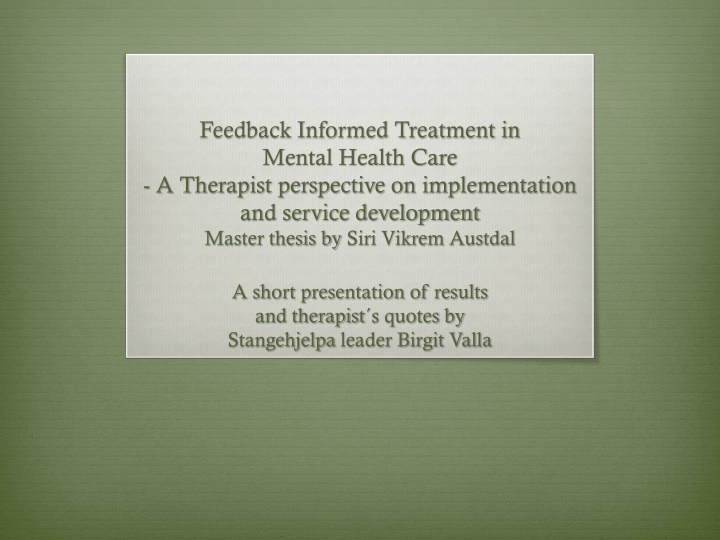Therapist Insights on Implementing Feedback-Informed Treatment in Mental Health Care
This qualitative study explored therapists' experiences with Feedback-Informed Treatment (FIT) and deliberate practice in mental health care. Therapists emphasized the importance of creating a safe environment for client feedback, navigating the demanding process of change during FIT implementation, and the crucial role of effective leadership in supporting and promoting FIT within mental health services.
Download Presentation

Please find below an Image/Link to download the presentation.
The content on the website is provided AS IS for your information and personal use only. It may not be sold, licensed, or shared on other websites without obtaining consent from the author.If you encounter any issues during the download, it is possible that the publisher has removed the file from their server.
You are allowed to download the files provided on this website for personal or commercial use, subject to the condition that they are used lawfully. All files are the property of their respective owners.
The content on the website is provided AS IS for your information and personal use only. It may not be sold, licensed, or shared on other websites without obtaining consent from the author.
E N D
Presentation Transcript
Feedback Informed Treatment in Mental Health Care - A Therapist perspective on implementation and service development Master thesis by Siri Vikrem Austdal A short presentation of results and therapist s quotes by Stangehjelpa leader Birgit Valla
Background The purpose of the study was to increase knowledge and understanding of Feedback Informed Treatment (FIT) and deliberate practice. The desire was to know more about the realism in implementing FIT, and what it means to let client feedback form the basis for therapist and service development. It is a qualitative study with a hermeneutic- phenomenological approach. 7 therapists from Familiehjelpa in Stange municipality (now Stangehjelpa) were interviewed, all of which had at least 3 years of experience with the use of FIT and engagement in deliberate practice.
1. Creating a climate for feedback Administering a feedback tool is no guarantee that the response you get is an honest picture of the clients reality. The therapist has a responsibility in creating a climate where the clients actually want to open up. I wish there were some guarantee that the mark they put on the scale was the full truth, but of course it never will be. This is not a lie detector. It s more about how I can get the person sitting in front of me to really open up. This thing about honesty really don t have anything to do with the scales, it has to do with us. If you really want to become a better therapist, you don t learn anything from high scores. We should crave low scores; what can I do different, what did you miss? Creating a climate for feedback is about culture in the service on how to best utilize FITs potential.
2. A demanding process of change About half of the therapists in the study had to go through a change process when implementing FIT. This was very demanding, and FIT was met with resistance at first. The processes of change that we have been through is extensive. It has not just been easy. At times it has been pretty tough. In my early experience with feedback it was inevitable not to feel uncertain about this, and I didn t know if I could believe that it would work. I was really worried about low scores in the beginning. I thought it was about me not doing a good job and I took it very personally. It is still personal, but now I see it as a potential for improving myself. All of the therapists felt less resistance after a while when they got to know FIT better and experienced its usefulness.
3. Leadership Most of the therapists said that leadership is essential. An unwavering belief in the value of FIT was mentioned as a key success factor. A working environment with encouragement to look at failing cases as an opportunity for improvement and possibility for trial and error was key. Good training and supervision was also mentioned as critical. Everyone need to get good training, follow-up and supervision. You can t be left alone with this, then it makes no sense. I am more autonomous than before. This means more responsibility, but also involves a lot of trust. I think this is important for the service to have become such a success. It is essential how this is managed. If you hadn t felt acknowledged for the work you do, or felt trust, then you wouldn t have been able to do this. It is a great deal of flexibility in the service that you can do different things. There are few limitations to what you can do to try to help people . Creative forces are set free when the therapists can reach their goals with their clients in their own ways. This is about the leader having trust in its employees.
4. Less boundaries between professions Freeing oneself from ones profession is a change from earlier work the therapist have had. Traditionally the professional identity has been in focus. FIT challenges this and opens up to the possibility to go beyond ones traditional tasks and to new territory. Earlier many of the therapist would refer the clients elsewhere if they thought it belonged to another therapeutic profession. Now the work is more characterized by the belief that one can contribute, even though one has to move beyond the limits of earlier ideas of professional boundaries. When doing FIT, profession has become less important. It is not your profession that decides if you do a good job. It is deliberate practice, and how you actively work on challenges, that makes you good.
5. Deliberate practice A key factor when working with FIT is deliberate practice. FIT depends on deliberate practice to become meaningful. The therapists had to extend their knowledge based on the feedback from the clients. This was always linked to results about the clients progress, and the therapists was always trying to find out what made the difference. I have never worked at a place where I have learned so much and read so much based on the topics that appears when working with the clients. Deliberate practice to me means never being completely satisfied It s not about attending a seminar here and there. This is a more deliberate way of acquiring knowledge. It has to be linked to what you need to get results.
5. Deliberate practice cont. It s not about learning a new method, but to understand in a deeper and different way, and working with people in a different way. The results show us if the clients are getting better, and that s what s important. Not if you used this or that method. The ambitions for the service is stated loud and clear. With this follows a demand for development with each single therapist. Support and encouragement from the leader is essential in challenging situations. We have a focus that nobody can stagnate, and nobody are allowed to stay put in their comfort zone . There are big ambitions for the service. We are constantly moving forward and becoming better. When each and everyone of us gets better, the whole service gets better and stronger. We have to dare to challenge ourselves and sweat.
6. High demands The therapists could experience it as strenuous to work at a place with such high demands. On the other hand there was a deep satisfaction in overcoming challenges and succeeding. It is strenuous. You are expected to deliver all the time. But being part of a team that dare to have new thoughts, and that wants something, is really exciting. I need it, or I would grow tired. It is demanding, but then there is that feeling we experience when we have climbed a mountain top. Then it is all worth while. It is incredibly fun to make new discoveries and experience mastery























